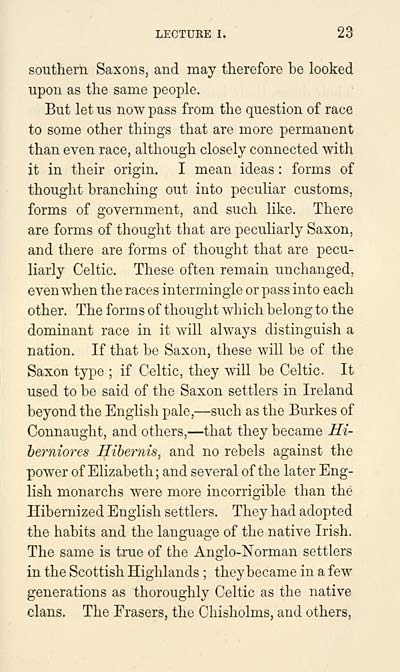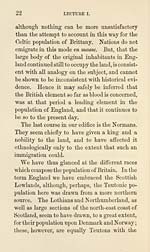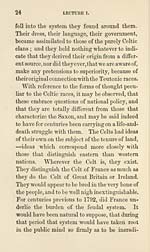Blair Collection > Celtic gleanings, or, Notices of the history and literature of the Scottish Gael
(35)
Download files
Complete book:
Individual page:
Thumbnail gallery: Grid view | List view

LECTURE 1. 23
southern Saxons, and may tlierefore be looked
upon as the same people.
But let us now pass from the question of race
to some other things that are more permanent
than even race, although closely connected with
it in their origin. I mean ideas : forms of
thought branching out into peculiar customs,
forms of government, and such like. There
are forms of thought that are peculiarly Saxon,
and there are forms of thought that are pecu-
liarly Celtic. These often remain unchanged,
even when the races intermingle or pass into each
other. The forms of thought which belong to the
dominant race in it will always distinguish a
nation. If that be Saxon, these will be of the
Saxon type ; if Celtic, they will be Celtic. It
used to be said of the Saxon settlers in Ireland
beyond the English pale, — such as the Burkes of
Connaught, and others, — that they became Hi-
herniores Hibeiiiis, and no rebels against the
power of Elizabeth ; and several of the later Eng-
lish monarchs were more incorrigible than the
Hibernized English settlers. They had adopted
the habits and the language of the native Irish.
The same is true of the Anglo-Norman settlers
in the Scottish Highlands ; they became in a few
generations as thoroughly Celtic as the native
clans. The Erasers, the Chisholms, and others.
southern Saxons, and may tlierefore be looked
upon as the same people.
But let us now pass from the question of race
to some other things that are more permanent
than even race, although closely connected with
it in their origin. I mean ideas : forms of
thought branching out into peculiar customs,
forms of government, and such like. There
are forms of thought that are peculiarly Saxon,
and there are forms of thought that are pecu-
liarly Celtic. These often remain unchanged,
even when the races intermingle or pass into each
other. The forms of thought which belong to the
dominant race in it will always distinguish a
nation. If that be Saxon, these will be of the
Saxon type ; if Celtic, they will be Celtic. It
used to be said of the Saxon settlers in Ireland
beyond the English pale, — such as the Burkes of
Connaught, and others, — that they became Hi-
herniores Hibeiiiis, and no rebels against the
power of Elizabeth ; and several of the later Eng-
lish monarchs were more incorrigible than the
Hibernized English settlers. They had adopted
the habits and the language of the native Irish.
The same is true of the Anglo-Norman settlers
in the Scottish Highlands ; they became in a few
generations as thoroughly Celtic as the native
clans. The Erasers, the Chisholms, and others.
Set display mode to: Large image | Transcription
Images and transcriptions on this page, including medium image downloads, may be used under the Creative Commons Attribution 4.0 International Licence unless otherwise stated. ![]()
| Early Gaelic Book Collections > Blair Collection > Celtic gleanings, or, Notices of the history and literature of the Scottish Gael > (35) |
|---|
| Permanent URL | https://digital.nls.uk/76269129 |
|---|
| Description | A selection of books from a collection of more than 500 titles, mostly on religious and literary topics. Also includes some material dealing with other Celtic languages and societies. Collection created towards the end of the 19th century by Lady Evelyn Stewart Murray. |
|---|
| Description | Selected items from five 'Special and Named Printed Collections'. Includes books in Gaelic and other Celtic languages, works about the Gaels, their languages, literature, culture and history. |
|---|

